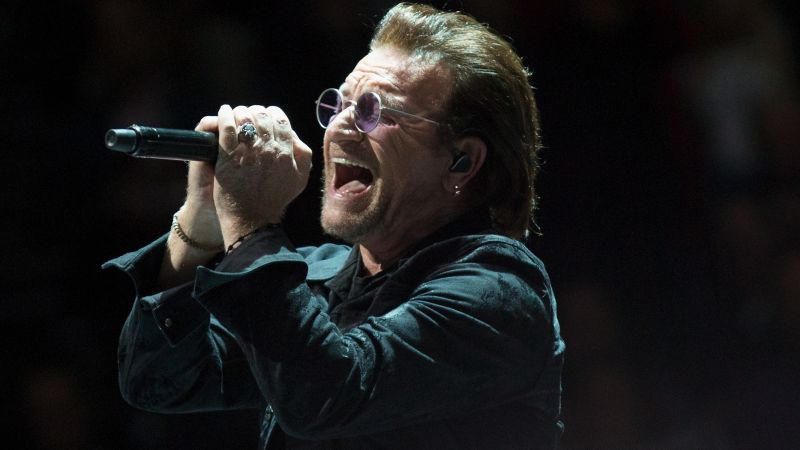Bono’s new book is more than a rock star memoir. It’s also a powerful tribute to America | CNN
CNN
—
While Bono was touring the US following the release of U2’s fifth studio album, he stopped by the Nashville home of country music icon Johnny Cash, who along with his wife June had invited him for lunch.
Cash was a popular performer in Bono’s native Ireland, and the two singers had already formed a friendship, bonding over music and their shared faith. Cash, who had struggled with addiction to alcohol and barbiturates, was a devout Christian.
As Bono sat at the kitchen table, he listened as Cash delivered “the most poetic grace I’ve ever heard.” Then Cash, “smiling under his breath, as if June couldn’t hear or see,” ended his grace with, “Sure miss the drugs, though.”
“For all his deep faith and conviction, he could never be the pious type, and maybe that’s why so many are drawn to him,” Bono writes about the lunch in his new memoir, “Surrender: 40 Songs, One Story.” “Johnny didn’t sing to the damned; he sang with the damned, and sometimes you sensed he might prefer their company.”
Some of this description could apply to Bono as well. Born Paul David Hewson in Dublin, Ireland, Bono is a global rock star, an activist and an entrepreneur who is currently touring the US to promote his memoir. All those facets are covered in an entertaining and occasionally hilarious 500-page book that vividly recounts passages from Bono’s life that he only hints at in his songs.
Bono’s book, though, is more than a rock star’s memoir. It’s a refreshing contrast to the way many Americans today view faith and politics.
A growing number of Americans have joined what one commentator called the Fractured States of America: They only befriend people who share their political and religious beliefs. But Bono forges close friendships and alliances with world leaders and politicians with whom he has fundamental disagreements.
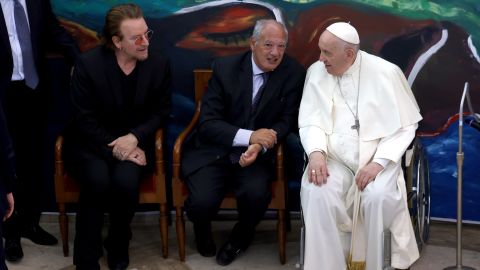
Even his faith connects religious elements that don’t normally intersect. In some book passages he sounds like an evangelical Christian, displaying a deep familiarity with scripture and a reverence for Christ. And yet he also says that he’s never found a church he could call home, and “that what the human spirit longs for may not be corralled by any sect or denomination.”
“It’s not just that some of the finest people I’ve known don’t subscribe to any particular faith tradition; it’s more that people who openly profess faith can be — how shall I put this? — such a pain in the arse,” he writes. “In a world where it’s impossible to avoid advertising, I don’t want the person next to me hard selling their take on the Big Questions. Live your love is the right answer.”
But Bono does express faith in another source. It’s what he describes as “the idea” of America.
As any casual fan of U2 knows, U2 has long had a close relationship with the US.
The group formed in Dublin in 1978 when Bono teamed with three high school classmates: Adam Clayton, Larry Mullen Jr., and Richard “The Edge” Evans. They broke through in the early ’80s with their third studio album, “War,” and became what Rolling Stone magazine once called a “live act simply without peer.”
Decades later, a band that Bono often says began with only “three chords and the truth” has gone on to win 22 Grammys, more than any other duo or group.
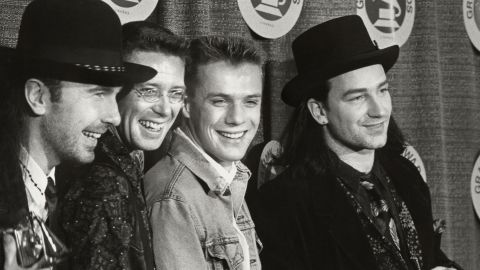
Part of the band’s success comes from their familiarity with the American songbook. Many of their most popular songs reflect a deep knowledge of American rock music, gospel and blues. It was U2, not an American artist, who wrote a stirring tribute to the Rev. Martin Luther King Jr., with their song, “Pride (In The Name of Love).”
In “Surrender,” Bono pays tribute to America itself. Some European bands dreaded touring the South and the Midwest, dismissing the regions as dull and unsophisticated. But Bono says U2 grew to love those parts of the US, “feeling the common decency of people who placed a high value on conservative themes like good manners and self-reliance, even though many held political views very different from our own.”
He quotes from the Declaration of Independence, from Franklin Delano Roosevelt’s famous 1933 inaugural address (“the only thing we have to fear is fear itself”) and cites the poem inscribed on the Statue of Liberty: “Give me your tired, your poor, Your huddled masses yearning to breathe free, The wretched refuse of your teeming shore.”
Bono expresses a belief and optimism in America that many Americans no longer share.
He says America is built on “an idea.” It’s a place that “offers grace for every welcome that is sought” from around the globe. He’s amplified this notion on his current book tour, saying at one stop, “America is a song still being written.”
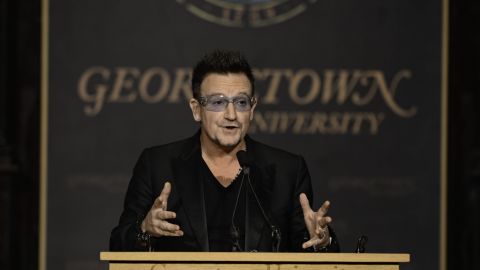
In a 2012 speech at Georgetown University, Bono gave perhaps his most detailed description of what America means to him. He said:
“Ireland’s a great country, but it’s not an idea. Great Britain’s a great country, it’s not an idea. That’s how we see you around the world, as one of the greatest ideas in human history – right up there with the Renaissance, right up there with crop rotations and the Beatles’ White album. The idea, the American idea … that you and me are created equal. And God love you for it, because these aren’t just American ideas anymore. There’s no copyright on them. You brought them into the world…These truths, your truths, they’re self-evident in us.”
Bono reminds readers that America has long had a mythical hold on the Irish. He says many Irish people glowed with pride when John Fitzgerald Kennedy became the country’s first Irish Catholic President and were astonished when the US became the first nation to put a man on the moon.
“Before transatlantic flights, when Irish people left their homes to go to America, it was like a death,” Bono writes. “They would never be seen again. And yet they would be reborn in this land of promise.”
Politics is now viewed by many Americans as a winner-take-all contest. There is no middle ground. No reason to compromise.
Some of this is fueled by a dangerous distortion of Christian faith. A growing number of Americans —almost half the country, according to one recent survey — now say the US was founded as a Christian nation and that there should be no separation between church and state. Some even say that violence is justified in defending this vision of America.
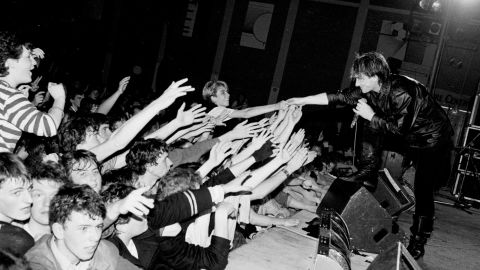
But Bono offers another model for how many Americans can practice politics and faith.
He comes from a country where thousands of people died because they could not find compromise on religion and politics.
He grew up in Ireland during a time when the northern part of the country split over whether it should remain in the United Kingdom or become independent. This disagreement, fanned by tensions between Protestants and Catholics, led to an explosion of violence between 1968 and 1998 that left more than 3,500 people dead. Many victims were civilians, maimed or killed by car bombs and other forms of violence in what became known as “the Troubles.”
This fractious history inspired him to adopt a personal mantra: “Compromise is a costly word. No compromise even more so.”
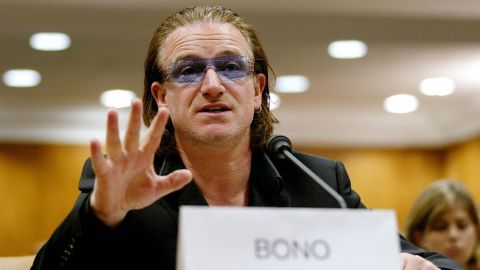
When Bono describes the “religious apartheid” that divided his country, it’s the only place in the book where he displays anger. He tears into paramilitary groups in Ireland that used violence and religious grievances to harm civilians in the name of freedom. He also recounts how he narrowly avoided becoming the victim of such a bombing one day.
He was raised by his father, Brendan Robert, a Catholic, and his mother, Iris, a Protestant, in an environment that disdained religious intolerance. He attended one of Ireland’s first nondenominational secondary schools, where students were taught to value religious diversity. It’s also where he met his wife, Alison, with whom he shares four children.
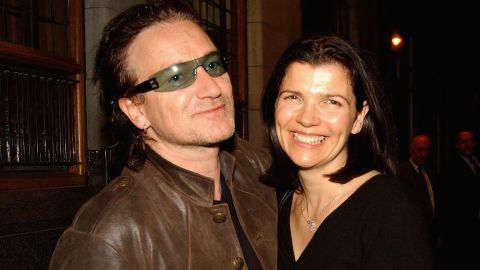
The lessons Bono learned in school about religious intolerance have carried into his career. In July 2005, during a concert in Berlin, Bono denounced Islamic extremists who had recently detonated bombs across London, killing 52 people and wounding hundreds.
He donned a headband bearing the word “Coexist,” which incorporated a Christian cross, a Star of David, and an Islamic crescent.
“Jesus, Jew, Mohammad, it’s true. All sons of Abraham,” he chanted from the stage, pointing to the symbols to plead for religious tolerance during a time of war – a gesture he repeated throughout the tour.
Bono has also had a dramatic impact offstage, through his activism. He was a leader in Jubilee 2000, a successful campaign that led to the cancellation of more than $100 billion in debt owed by poor countries. He co-founded sister organizations ONE and (RED) to fight against extreme poverty and the spread of HIV/AIDS in developing countries.
Many rock star memoirs recount going from sold-out arenas to trashed hotel rooms. Bono describes meeting politicians and philanthropists in a “world of suits and sandwiches and fluorescent lamps.” He flourished in that new arena because of his ability to reach agreement with all manner of leaders.
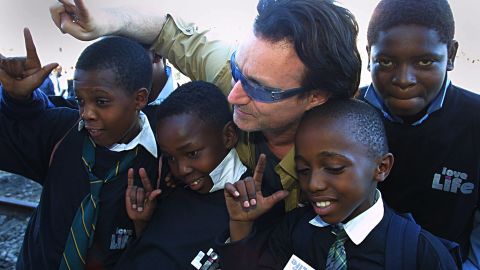
For example, Bono persuaded Senator Jesse Helms, the conservative US senator who opposed making King’s birthday a national holiday and had called AIDS “the gay disease,” to provide funding to combat the AIDS crisis in Africa.
How’d he do it? Bono says he found common ground with Helms by invoking stories about how lepers were treated in the Bible. He says the analogy reduced to Helms to tears.
“The search for common ground starts with a search for higher ground,” Bono writes in the memoir. “Even with your opponents. Especially with your opponents. A lightbulb moment for me and a conviction that’s informed my life as a campaigner ever since. The simple but profound idea that you don’t have to agree on everything if the one thing you do agree on is important enough.”
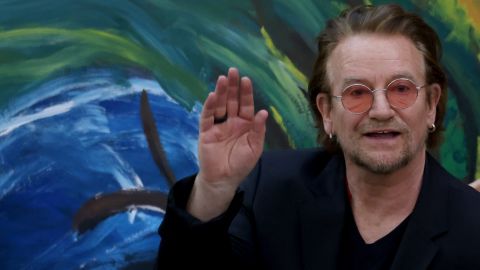
U2 fans have long speculated about Bono’s spiritual beliefs. Near the end of his memoir, he defines himself as a flawed but genuine “follower of Christ who can’t keep up.”
“I hold to the line attributed to Francis of Assisi, who told his followers, ‘Go into the world to preach the Gospel and, if necessary, use words,’ ” he says.
That sentiment might sound like a platitude from a rich rock star. But at a time when the US is experiencing its own Troubles — a dangerous escalation of political and civic strife — these words may be just what many Americans need to hear.
For all the latest entertainment News Click Here

